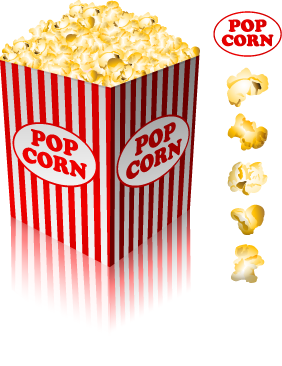How the science of popcorn can help you learn Chinese pronunciation
11.12.2013 14:30:52
 Are you aware that some of the most recent scientific studies on popcorn can benefit your Chinese learning?
Are you aware that some of the most recent scientific studies on popcorn can benefit your Chinese learning?
It's not a joke.
You may already have heard about the discovery. Eating popcorn in the cinema makes you partly immune to the advertising before the actual movie. Why is that? And what does it have to do with learning Chinese?
One might first think the reason is as simple as that the munching of popcorn simply distracts the viewer. But there is more to it than that.
Anytime we see or hear a word, our facial muscles automatically and very discreetly/silently practice its pronunciation. This subconscious repetition aids your memory. But if your mouth is busy chewing popcorn, then no practicing happens, and you don't remember the advertisement's message that well.
(You may read more about the popcorn discovery here)
How to apply the popcorn science on learning Chinese
The question is, how does this apply to learning Chinese pronunciation?
The answer is: Don't attempt to learn Chinese just by studying a book. Use your mouth as much as possible. Your greater memory muscle (your brain) is connected to your sound-producing muscles. So feed your memory with some more food-for-subconscious-thought by semi-silently practicing Chinese pronunciations.
If subconsciously repeating words heard and seen in an advertisement, can more or less manipulate you into buying some unnecessary product, then just imagine what a conscious effort could do for your Chinese!
But how?
All right, so that is all very good, but how to actually go about this in an already very busy daily routine?
If your "inner (reading) voice" is not very active, then make it a habit to read out loud (or even just whisper) the Chinese words you see around you. If you're not living in a Chinese-speaking area, then add some more Chinese to your current surroundings. Place post-it notes with Chinese words in your home - and be careful not to ignore them. You can put some on your fridge, beside your bed, remote controllers, shoes, on doors, bathroom etc.
Of course this will do little to make you fluent in Chinese, but it will help your brain memorize pronunciations of Chinese words. This is a necessary building block to achieving greater Chinese proficiency.
Except from covering your home and office with post-it notes, you can also resort to traditional reading. Find some Chinese texts that are somewhat challenging for you to understand, and practice reading it. Your brain will subconsciously absorb both the pattern and rhythm of the language. Don't forget to read it out loud. Unfortunately, I'm not able to provide supporting evidence for this, but I'm convinced that reading out loud will yield 10 times better results than silent reading.
When I started learning Chinese, I was generally fond of reading out loud, so I naturally did the same with the Chinese texts I had to study. My Chinese reading ability was obviously very limited, but it still did me very good to read out loud. In the beginning I didn't feel any significant difference, but looking back after a few years it is clear that loud reading helped me a lot.
Before you memorize pronunciation too well, you may want to compare with the Standard Mandarin software, to make sure you're learning it properly right from the start. Otherwise you'd have to attempt unlearning wrong pronunciation later, which can be very hard.
Isn't it nice that we are able to apply this discovery made by the advertising business on the non-commercial activity of learning Chinese?
What is the difference?
Will reading this make a difference for your Chinese learning?
Please share your thoughts in the comment box below.
You may already be doing as suggested above. If so, perhaps you'd like to share your thoughts on its effectiveness.

Did you like this page?